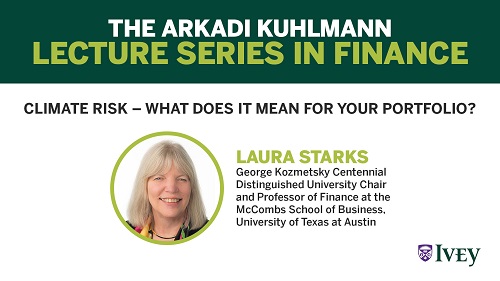As evidence of global warming continues to intensify, investors are turning up the heat on companies to disclose their climate risk, which could eventually prompt mandatory reporting, says Laura Starks, an award-winning researcher on sustainable finance.
“Investors believe that climate risk disclosure is important,” said Starks, a finance professor at the McCombs School of Business, University of Texas at Austin. “They are engaging with companies. They are pressuring firms to disclose more and when there is a change in disclosure rules, they are investing more in those companies.”
Speaking virtually from Texas where an ongoing heat wave bears further evidence of climate change, Starks, the keynote speaker for the 2022 Arkadi Kuhlmann Lecture Series in Finance, discussed how investors are rethinking their portfolios in light of increasing climate concerns. The event was moderated by Craig Dunbar, an Associate Professor of Finance and holder of the Tangerine Chair in Finance.
Climate risk is considered investment risk
Starks said over the last few years, the Carbon Disclosure Project has made some gloomy predictions about the cost of climate risk for companies and their supply chains, but a lot depends on decarbonization efforts.
“There’s no question there may be very high costs – people are expecting very high costs to climate change. But these estimates are based on future expectations and there exists a lot of uncertainty about what could happen next,” she said.
Sharing findings from several surveys of institutional investors on how they view climate and other environmental regulatory risks, Starks said the majority of investors worry about climate risk, whether it be the impact of extreme weather on productivity, regulatory liability concerns, or damage to a company’s reputation, and believe the risks are already materializing.
Influencing climate solutions
As a result, they are diversifying their portfolios to put less weight on problematic firms, engaging with firms on ways to manage climate risk issues, and/or chanelling their money toward more climate-friendly businesses. There can be several motivations for doing so, including personal values, financial concerns, or to reflect clients’ preferences.
Starks told how that changing investor sentiment has influenced organizations’ actions to mitigate climate change. Among other things, investors are encouraging companies to report their emissions and reduce their carbon footprints. Starks cited that a growing number of institutional investors, such as university endowments and public pension funds, have already publicly announced their commitment to divest from fossil fuels.
Turning risk into opportunity
And although climate risk is usually considered in light of the negative effects on asset values, Starks shared examples of return opportunities arising from climate risk through investments in renewable energy, water, and electric vehicles.
Watch the full presentation (click on image above)
The Arkadi Kuhlmann Lecture Series in Finance honours Arkadi Kuhlmann, HBA '71, MBA '72, LLD '10, and aims to bring speakers with thought-provoking and practical information about the world of finance.




